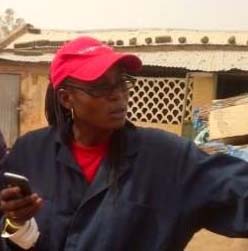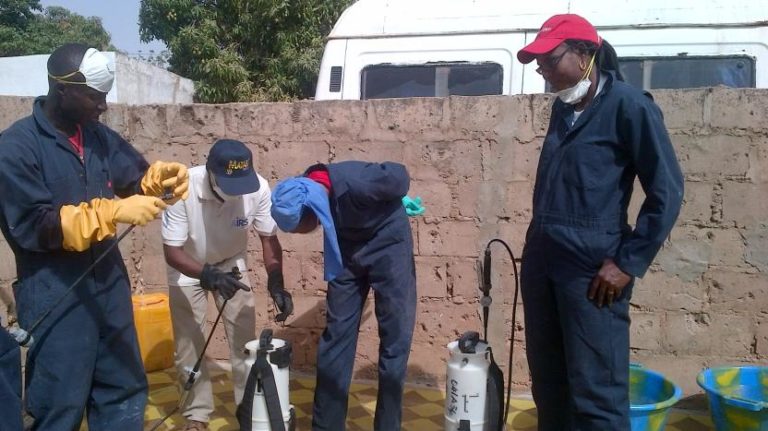DAKAR, SENEGAL
Dr. Ndombour Gning Cisse began working on the President’s Malaria Initiative (PMI) Africa Indoor Residual Spraying (AIRS) Project in Senegal in 2011 as Spray Operations Coordinator. In 2014, she was promoted to Operations Manager and now leads the management of spray operations in target districts, working with the National Malaria Control Program. In 2015, she took on the additional role of AIRS Senegal’s Gender Focal Person. Dr. Cisse is a PhD in Animal Biology and holds an MBA in Project Management
Do you have any personal experience with malaria?
I’m from Senegal’s Bambey Department where there is very high incidence of malaria. It affects school performance and agriculture productivity. I’ve been a part of PMI’s efforts for malaria prevention since 2009. During my field visits in health facilities, I came across many children suffering from malaria. The efforts of health workers to save lives from malaria motivated me to work on indoor residual spraying (IRS) as a way to control the disease. Malaria remains a serious public health threat, particularly in rural areas. Eliminating malaria must remain a key priority for each of us to increase attendance at school, improve worker productivity, and support local economies.
What do you find most challenging about your job?
Reducing the cost of IRS is the most challenging part. We are developing a new model for IRS, which requires community involvement as well as transferring skills to local institutions to successfully develop and implement a country capacity-building plan. In 2014, we reduced the number of spray days from 45 days in 2013 to 20 in 2014, reducing the cost of car rental and operational sites and offices. The challenge continues as we advocate for the community to provide free operational sites and offices.
What impact has IRS had on malaria in Senegal?
PMI has supported IRS in Senegal since 2007. According to the successful IRS results in malaria control, PMI’s funding for IRS was expanded to others districts in 2010 and 2012. Since 2015, the NMCP and the IRS steering committee conducted a new strategy for IRS, targeting areas where malaria morbidity and mortality rates are higher than 15 cases per 1000 residents. IRS has made significant progress and remains the best strategy for malaria prevention control. The new national strategic plan to fight against malaria, which has set a target of pre-elimination, focuses on
endemicity levels.
What changes have you seen in IRS implementation since the project began?
IRS requires great effort and good planning. The PMI AIRS Project has introduced new tools to better monitor activities to track IRS performance. Senegal is one of the first countries piloting the short-message system (SMS) platform to disseminate spray campaign data to PMI and local stakeholders on a daily basis. AIRS Senegal also piloted a smartphone application to standardize supervision throughout the campaign, improving overall spray campaign quality. Since 2012, AIRS Senegal has used IRS cards to track which households had been sprayed. However, printing costs were expensive and several cards were lost or misplaced by beneficiaries. A new tracking system for households was proposed: chalk marking and zip ties. Both methods improved supervision and identification of sprayed and unsprayed structures. Zip ties helped us to identify refusal cases in order to resolve them.
Can you talk about your role as Gender Focal Person?
I’m in charge of promoting gender equality in IRS program implementation. Successful results were noted involving women’s associations, such as Badjenou Gokh. Badjenou Gokh, a women’s volunteer community group, played a key role transmitting gender messages door-to-door. They helped bring about an understanding of the roles women can play in IRS and advocated for the hiring and recruitment of women in the project. The percent of women hired as seasonal IRS personnel increased from 20 percent in year 2014 to 31 percent in year 2015. Due to the promotion of gender-inclusive strategies, the percentage of women hired in supervisory roles increased from 9 percent to 21 percent during that same period.
What is your hope for Senegal’s NMCP?
My hope is that the NMCP will increasingly provide more resources to eliminate malaria in Senegal. Many strategies have been developed for the affected area. Additional community health staff includes matrons, who are trained birth attendants; and mobilizers, who are health educators and communicators. Since 2008, a new type of health worker, the village malaria worker (home care provider or DSDOM in French), provides testing with RDTs and treatment with ACTs through the home-based management of malaria, now active in approximately 1,000 villages where health services are difficult to access. The DSDOMs work independently from their homes, without a formal health structure or management committee. Both health huts and DSDOMs are linked to their supervising health post by the commodity supply chain and the health information system. PMI supported the country in the distribution of free and subsidized long-lasting insecticide treated beds nets (LLINs) nationwide. NMCP is doing well and has made significant progress against malaria. It remains a leader in piloting new strategies to reach its objectives and is effective with its interventions, but I think it is very important and crucial that NMCP continue targeted IRS in others districts with high mortality and morbidity rates.
What kind of impact have you seen from the PMI AIRS Project?
The PMI AIRS Project has greatly contributed to building country capacity in IRS implementation. As we transition IRS implementation to the Ministry of Health (MOH), the project plays a key role in building capacity of NMCP and all stakeholders (such as health agents from medical regions and districts, including the National Hygiene Service, the Environmental Compliance Division, the Regional Bureau of Education and Information for Health, IRS focal points, and medical officers). Local authorities have expressed their satisfaction with our work. The Government of Senegal (GOS) took a step forward in ownership throughout its different entities (MOPH, DEEC, SNH, LEVP) involved in malaria control.
This story was taken from www.africairs.net.


